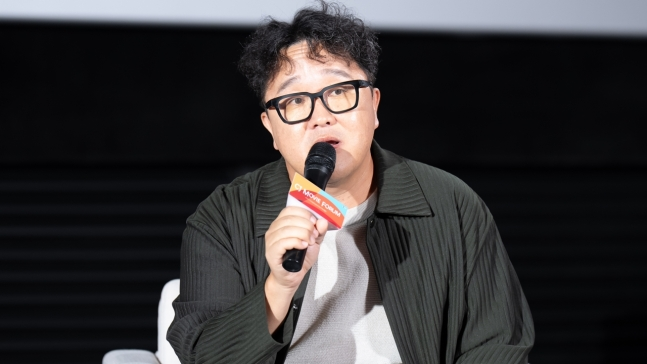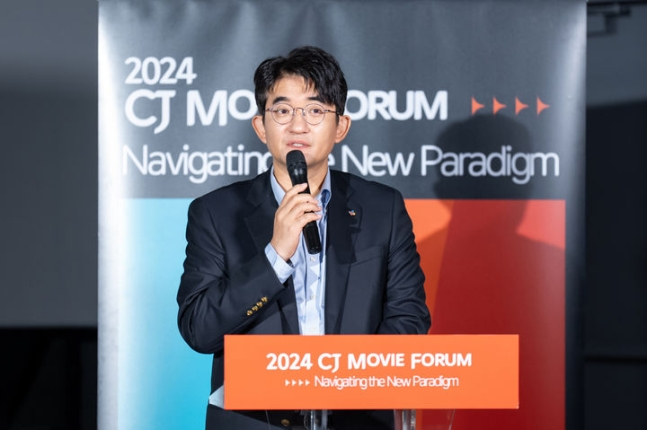 Family by Choice and Face Me's ratings drop
Family by Choice and Face Me's ratings drop
The CEO of Studio Dragon — the South Korean drama production, marketing and distribution company credited for hit K-dramas like The Legend of the Blue Sea, Arthdal Chronicles, Crash Landing on You, The King: Eternal Monarch, Kingdom: Ashin of the North, Doom at Your Service, Hometown Cha-Cha-Cha, Bad and Crazy, Alchemy of Souls, Big Mouth, Gyeongseong Creature, Queen of Tears, Love Next Door) — Jang Kyung Ik announced that Studio Dragon will co-produce Crash Landing on You's remake with Netflix's headquarters in the U.S.
On October 4, the CJ Movie Forum took place at CGV Centum City in Haeundae-gu, Busan, during the 29th Busan International Film Festival. Among those attending the forum's "Leaders Talk" were Seo Jang Ho, General Manager of the Global Content Department at CJ ENM; Lee Dong Hyun, business innovation executive at CJ CGV; Choi Joo hee, CEO of TVING; and Jang Kyung Ik, CEO of Studio Dragon.
In the present scenario, where the Korean entertainment industry — particularly the film sector — is struggling to reach the break-even point in the domestic market alone, CEO Jang emphasized that the global market is not an option but a necessity.
He stated, "Studio Dragon has a strong desire to go global. This isn't just our slogan — there are actually quite a few projects being planned in collaboration with global partners."
He went on to reveal that in the case of Crash Landing on You, which holds the second-highest viewership rating in tvN history, they will not simply sell remake rights but will also co-produce the series with Netflix's headquarters in the U.S.

CEO Jang also emphasized the importance of the Japanese market. He stated, "With Japan's TBS, we've not only regularized creator meetings but also laid the groundwork for joint planning and production of IPs." He added, "We have made considerable preparations at the foundational level, and soon we'll be able to show significant results."
Seo Jang Ho, General Manager of the Global Content Department at CJ ENM, pointed out, "Drama production costs have nearly doubled compared to pre-pandemic levels, and advertising sales, our main source of revenue, are falling. To offset the decreasing profitability, we are focusing on overseas sales."
Amid growing concerns that the challenges faced by the entertainment industry are at an all-time high, Jang highlighted that global expansion and collaboration with markets like the U.S. and Japan could serve as a powerful breakthrough.
"We are seeking additional growth engines through the production of local dramas primarily in the U.S. and Japan. Currently, we are in the planning and development stages for about 20 global projects." CEO Choi explained, "We are concretizing our global expansion strategy, focusing on regions where K-content is gaining significant traction, such as the U.S., Southeast Asia, and Japan."
Seo emphasized, "How we develop markets where the popularity and revenue of Korean content are not very high, such as India and the Middle East, is also extremely important. Developing new markets requires various investments, including dubbing, and we also need proactive support from the government for this."

(CEO Jang Kyung Ik of Studio Dragon)
CEO Jang analyzed, "The domestic drama market will shift from a competition in quantity to a competition in quality content," and revealed plans to "take this as an opportunity to improve the quality of K-dramas by focusing on good [script] materials, direction, and acting. We also plan to increase projects that boldly employ new creators and rising actors."
CEO Yoon of CJ ENM, the entertainment company that owns Studio Dragon, also elaborated on the challenges the K-entertainment industry is facing. He first stated, "We will continue to lead the K-content ecosystem by maintaining our annual content investment of 1 trillion won, the highest in the country."
 He mentioned that as CJ ENM celebrates its 30th anniversary next year, it "aims to remain faithful to the essence and fundamentals of the content business." "By spreading the competitiveness of our 'Only One IP (Intellectual Property)' worldwide, we will transform into a global IP powerhouse that leads a new ecosystem in the cultural industry. We will create a virtuous cycle where talented creators can realize their dreams of [making whatever] content [they wish] and expand globally together."
He mentioned that as CJ ENM celebrates its 30th anniversary next year, it "aims to remain faithful to the essence and fundamentals of the content business." "By spreading the competitiveness of our 'Only One IP (Intellectual Property)' worldwide, we will transform into a global IP powerhouse that leads a new ecosystem in the cultural industry. We will create a virtuous cycle where talented creators can realize their dreams of [making whatever] content [they wish] and expand globally together."
Expressing concerns about the growing uncertainties in the film industry, Yoon said, "We're at a point where we're questioning whether the success formula that once allowed us to produce numerous 10-million-moviegoer films, that captured artistic quality while also bringing box office success, will still be effective in the future," he admitted. He continued, "This is why we are becoming more thoughtful and cautious with each step we take in the film industry. But we still believe in the power of storytelling that moves the world." "We want to be the first partner that filmmakers with great stories and ideas think of. CJ will support filmmakers with our accumulated expertise and insights across various fields, including global studios, theaters, and OTT platforms."
There have been persistent rumors that CJ ENM might exit the film business due to a string of major box office failures. However, Koo Chang Geun, the then-CEO of CJ ENM, dismissed these rumors during last October's Busan International Film Festival, stating, "That is not true."
CEO Yoon pointed to the rise of online streaming services (OTT), the increasing costs of content production, and the advancement of artificial intelligence (AI) technology as key elements of uncertainty.
He noted, "As we're seeing the emergence of OTT services, replacing theaters, a variety of alternatives to capture audience attention, from short-form content to short dramas are emerging. There's even a joke going around, saying, 'How do you expect to keep young people sitting in a dark room (theater) for more than two hours these days?'"
He further explained, "As content production costs skyrocket, many content and platform companies are focusing more on profit efficiency. There is also growing interest in how AI technology will upgrade the quality of video content and reduce the skyrocketing production costs."
Lee Dong Hyun, the business innovation executive at CJ CGV, the largest multiplex cinema chain in South Korea, expressed concerns about the slow recovery of theaters post-pandemic, saying, "The number of theatergoers remains at about 60% of 2019's pre-pandemic levels. While it's gradually improving, the pace is very slow. If this trend continues, 60–70% of 2019's numbers could become the 'new normal.'"
Jang Kyung Ik, CEO of Studio Dragon, stressed, "We need to find new business models. Simply cutting production costs isn't the solution. What's more important is creating 'well-made' works."
In the final session, titled "Global Talk", CJ ENM's Film Business Division Director Ko Kyung Bum, along with emerging creators Yoo Jae Sun, Han Jun Hee, and director Jeon Go Woon gathered to explore the charm of K-content and seek solutions for global expansion.
Ko noted the reasons for the popularity of Korean stories, highlighting "the ability to bring fresh yet rich stories and visuals through hybrid genres, as well as the use of universal cinematic language that Hollywood filmmakers can easily approach while maintaining cultural uniqueness." He added, "Since we have been exploring various global avenues, such as Hollywood remakes, direct overseas expansions, and local adaptations of hit IPs, we will help Korean creators find ways to enter international markets that are suitable for the nature of their works if they can come up with stories they are good at."











